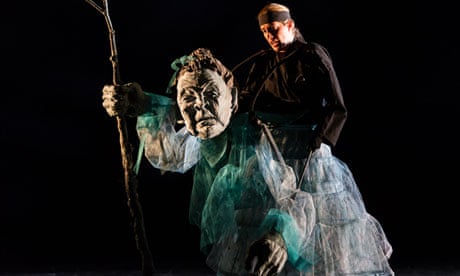British Youth Opera's new production of Judith Weir's A Night at the Chinese Opera is timely. Weir's reputation was dented by her last opera, Miss Fortune, deemed unsuccessful at its UK premiere last March. Hearing this earlier piece, however, is a forceful reminder of just how fine an opera composer she can be.
Set in 13th-century China shortly after the Mongolian invasion, the piece is essentially a fable about the power of art to change lives. Chao Lin, orphaned in early childhood, serves the invaders as a canal builder, unaware of the moral ambiguities of collaboration and the regime's responsibility for his parents' deaths. It is only when he watches a play, the narrative of which closely mirrors his own life, that he realises who he is and what he has become. But his decision to emulate his theatrical alter ego and avenge his family leads to catastrophic consequences, far removed from those in the play itself.
Weir's subtle, exquisite fusion of eastern and western styles is reflected in a production of considerable grace by Stuart Barker. The opening – in which the Nightwatchman (Samuel Smith) sleeps by a model of the Great Wall of China as the invaders emerge from the shadows of the auditorium – is particularly beautiful. Barker uses life-size puppets, to striking effect, both for Chao Lin as a child and for the shadowy forms, possibly projections of his own psyche, that his adult incarnation (Johnny Herford) encounters on his way to his confrontation with James Hall's military governor. When the Actors (Catherine Backhouse, Louise Kemeny and Peter Kirk) perform their opera-within-the-opera, the rest of the cast, Herford excepted, mingle with the audience in the stalls.
Lionel Friend's conducting, meanwhile, brings out all the detailed nuances of Weir's instrumentation, and there is some fine singing. Herford and the three Actors are excellent.
Hall's eerie countertenor sounds infinitely baleful, and Smith, in addition to playing the Nightwatchman, nearly steals the show at one point, camping it up as Marco Polo. One problem, however, is variable diction. The Peacock's slightly foggy acoustics admittedly don't help. But in a work in which the performers frequently step out of character and simply tell the story, we occasionally lose the narrative thread. It's a good show that would be much better if we could hear every word.
What have you been to see lately? Tell us about it on Twitter using #GdnReview

Comments (…)
Sign in or create your Guardian account to join the discussion